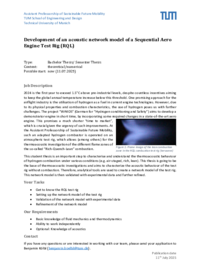Development of an acoustic network model of a Sequential Aero Engine Test Rig (RQL)
- Institut
- Professur für Sustainable Future Mobility
- Typ
- Bachelorarbeit Semesterarbeit
- Inhalt
- theoretisch
- Beschreibung
Job Description
2024 is the first year to exceed 1.5°C above pre-industrial levels, despite countless incentives aiming to keep the global annual temperature increase below this threshold. One promising approach for the airflight industry is the utilisation of hydrogen as a fuel in current engine technologies. However, due to its physical properties and combustion characteristics, the use of hydrogen poses us with further challenges. The project “WAKOS” (German for “Hydrogen conditioning and Safety”) aims to develop a demonstrator engine in short time, by incorporating some required changes in a state-of-the-art aero engine. This promises a much shorter “time to market”, which is crucial given the urgency of such improvements. At the Assistant Professorship of Sustainable Future Mobility, such an adapted hydrogen combustor is operated on an atmospheric test rig, which allows (among others) for the thermoacoustic investigation of the different flame zones of the so-called “Rich-Quench-Lean” combustion.
This student thesis is an important step to characterise and understand the thermoacoustic behaviour of hydrogen combustion under various conditions (e.g. air-staged, rich, lean). This thesis is going to be the base of thermoacoustic investigations and aims to characterize the acoustic behaviour of the test rig without combustion. Therefore, analytical tools are used to create a network model of the test rig. This network model is then validated with experimental data and further refined.
Your Tasks
- Get to know the RQL test rig
- Setting up the network model of the test rig
- Validation of the network model with experimental data
- Refinement of the network model
Our Requirements
- Basic knowledge of fluid mechanics and thermodynamics
- Ability to work independently
- Optional: Knowledge of acoustics
Contact
If you have any questions or are interested in working with our team, please send your application to Benjamin Kölbl (benjamin.koelbl@tum.de).
- Möglicher Beginn
- now
- Kontakt
-
Benjamin Kölbl
Raum: 1703b
Tel.: +49 (89) 289 16235
benjamin.koelbltum.de - Ausschreibung
-
